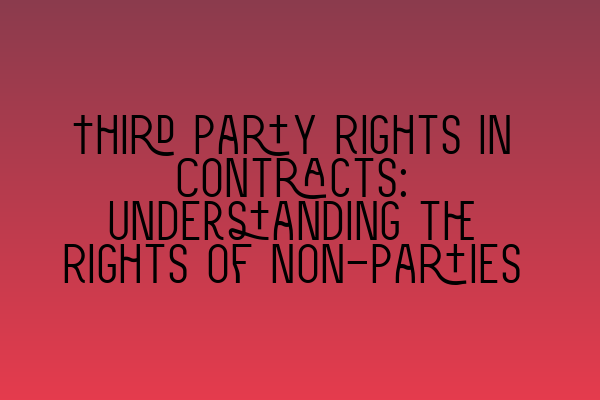Third Party Rights in Contracts: Understanding the Rights of Non-Parties
Contracts are legal agreements that define the rights and obligations of the parties involved. Typically, these parties are the ones who entered into the contract and are bound by its terms. However, there are instances where the rights of individuals who are not parties to the contract may be affected. This brings us to the concept of third party rights in contracts.
In this article, we will explore the nature of third party rights, their implications, and how they can be enforced. Understanding third party rights is essential for both solicitors and individuals entering into contracts to ensure that all parties involved are fully aware of their rights and responsibilities.
What are Third Party Rights in Contracts?
Third party rights refer to the rights that are granted to individuals who are not parties to a contract. In other words, these individuals are not directly involved in the negotiation or execution of the contract itself. Despite this, they may still have rights conferred upon them by the contract.
There are various reasons why third party rights may arise in a contract. For instance, a contract may include a provision that explicitly grants rights to a specific person or class of people who are not parties to the contract. In such cases, these individuals can enforce the rights given to them as if they were parties to the contract.
However, it is important to note that third party rights are not automatically granted in every situation. In general, third party rights can only be enforced if:
– The contract includes an express term that grants such rights.
– The third party is explicitly identified or identifiable in the contract.
– The contract intends to confer a benefit or impose an obligation on the third party.
– The third party has communicated their acceptance of the rights conferred upon them.
It is crucial for solicitors and individuals drafting contracts to consider these factors carefully. Failing to address the issue of third party rights can lead to confusion and potential disputes in the future.
Implications of Third Party Rights
Third party rights can have significant implications for all parties involved in a contract. It is important for solicitors to advise their clients accordingly to avoid any unintended consequences.
For instance, granting third party rights may limit the control that the contracting parties have over the contract. This is because the third party may have the power to enforce specific terms or seek remedies for any breaches. In some cases, this can lead to a loss of flexibility for the contracting parties and may even affect their bargaining power during negotiations.
Furthermore, disputes can arise when the rights conferred upon the third party conflict with the interests of the contracting parties. It is important to carefully consider the potential impact of third party rights and ensure that all parties are fully aware of their implications before finalizing a contract.
Enforcing Third Party Rights
To enforce third party rights, the third party must meet certain criteria to establish their entitlement. These criteria may vary depending on the jurisdiction and the specific terms of the contract. It is advisable to consult with a solicitor who specializes in contract law to ensure that third party rights are properly enforced.
In some cases, the third party may need to provide evidence to demonstrate their acceptance of the rights conferred upon them. This can be done through written communication or by performing actions that clearly indicate their intention to accept the rights.
If the third party meets the necessary requirements, they can enforce their rights either through negotiation, mediation, or by taking legal action. The specific remedies available to the third party will depend on the nature of the contract and the jurisdiction in which it is governed.
Conclusion
Understanding the rights of non-parties in contracts is essential to ensure that all parties involved are fully aware of their rights and obligations. Solicitors play a crucial role in advising their clients on the implications of third party rights and ensuring that contracts are drafted in a manner that addresses these issues.
For more information on contract law and related topics, please refer to the following articles:
– Exploring the Impact of Frustration on Contractual Obligations: Legal Insights
– Interpreting Contractual Clauses: Unlocking the Hidden Meanings
– Legal Aspects of Business Contracts: Key Considerations for Entrepreneurs
– Agreements in Contract Law: Understanding Its Various Types
– Essentials of Consideration: Understanding the Basis of Contractual Exchange
Remember, seeking legal advice from a qualified solicitor is always recommended to ensure the proper understanding and application of contract law.
